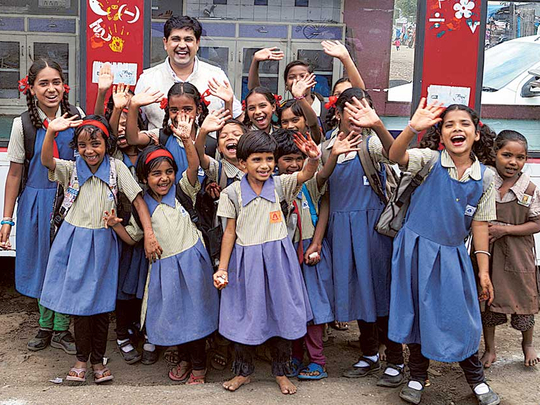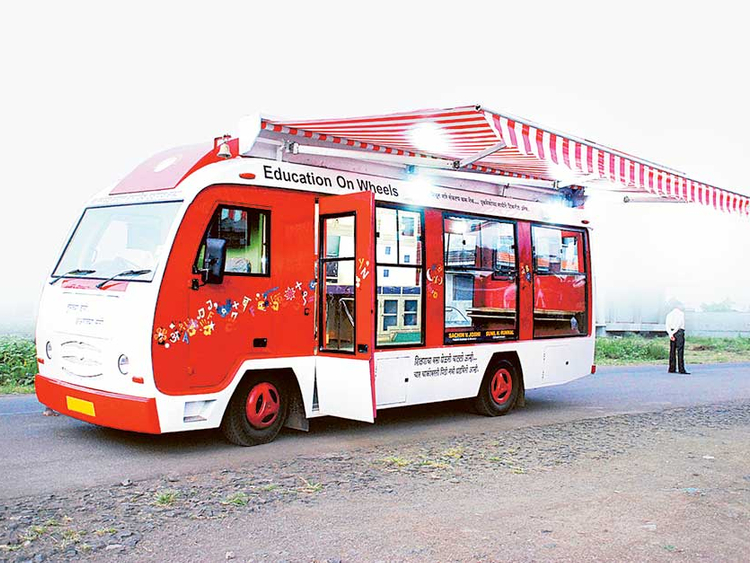
New Delhi: Thirty nine-year-old Sachin Joshi had scraped through school and college. But that did not deter him from opting to work in the field of education for the betterment of the system. The educationist from Nashik in Maharashtra, was recently invited to the World Forum for Democracy, organised by the European Council and European Parliament in Strasbourg, France, to speak on the topic ‘Democracy and equality — Does education matter?’
The European Council has been organising this conference annually since the last eight years with varied themes relating to strengthening of democracy. What took Joshi to attend the conference that saw 121 speakers from all over the world, were his efforts on educating children in rural areas.
Conversing about the conference, Joshi told Gulf News, “It was a highly enriching experience. Pioneers of democratic education techniques revealed how they had successfully involved children in designing and developing school curriculum. They asked if we would be willing to give the right to children to design at least 20 per cent of their curriculum.
“I believe, this is a unique idea to sow the seeds of democracy in young minds. It will instill a level of confidence in children so that they learn what they have themselves chosen in the syllabus.”
Education is not just about progressing up the ladder from kindergarten to college, but a life-long journey of learning, which opens new avenues for children.
With this concept in mind, Joshi had started ‘Education on Wheels’ in 2007 and reached out to children in the slums. His aim was to approach children who do not go to school or are dropouts and provide them education at their doorsteps.
He explains, “Instead of buying a bus, I decided to just purchase the chassis. It took about a year to built the body of the bus, as both the interior and the exterior had to be designed to function as a mobile school. The total investment was Rs1.6 million (Dh86,142), some of which I borrowed from people.
The colourful mobile van, designed with a TV set, a computer and a library was so captivating that it instantly attracted youngsters, who out of curiosity, would come running to have a look at it.
“Going for creative methods of teaching, initially, I would just sing so that they felt comfortable and not feel burdened. This made the children come back the next day. The next step was to show them informative and inspirational movies and thereafter discussing certain aspects such as personal hygiene and cleanliness. I would then instill in them the need for education and how it could change their lives,” he said.
Once the children got hooked to his way of teaching, Joshi launched an ambitious scheme ‘Citizen Campaign’ to identify underprivileged children and get them admitted to Nashik Municipal Corporation schools. The theme of the campaign was ‘Every Child Counts’.
The modus operandi of the campaign remains simple. Anyone finding a child in the age group of 6 to 8 years not going to school just dials a helpline number. Joshi’s team then finds out the child, counsels him and parents about the need for the child to go to school. Thereafter, the volunteers either find a municipal-run school nearby or a private school where admission is secured for the child. With support from NGOs, corporate sector and the government, he has also started a mobile app Identifykids, which serves a similar purpose.
Citing reasons for school dropouts, Joshi says, “Babysitting siblings, lack of transport or no proximity to school, are major factors. We often come across labourers who are reluctant to enroll their children in schools because they want them to toil like themselves and support the family financially. However, lack of education, keeps the family perennially poor. But if these children start going to schools, child labour will slowly be eradicated.”
The educationist has been able to bring hundreds of out-of-school children back into the mainstream after receiving inputs from people. The Nashik Municipal Corporation appointed teachers to identify such children through the app, which was of immense help. The concept is now being implemented in other cities and towns of Maharashtra and in Rajasthan state.
• In India, 25 million children are unable to attend schools for various reasons.
• Maharashtra state accounts for the highest number of slum dwellers.
• Nashik city alone has 104 registered and 22 unregistered slums.
• Through ‘Education on Wheels’, Sachin Joshi has educated over 1,000 child labourers and children of rag pickers and construction workers. He is instrumental in bringing over 4,500 dropout children back into the mainstream.
• ‘Education on Wheels’ classes are conducted both inside and outside the bus for at least two hours, before the bus heads to another destination.
• In 2007, Joshi entered the Limca Book of Records for being the ‘Youngest Educationist’ implementing innovative concepts.













